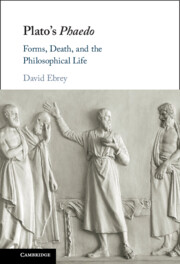Refine search
Actions for selected content:
4 results
5 - Marius Victorinus
-
- Book:
- Human Salvation in Early Christianity
- Published online:
- 09 January 2025
- Print publication:
- 23 January 2025, pp 130-160
-
- Chapter
- Export citation

Plato's Phaedo
- Forms, Death, and the Philosophical Life
-
- Published online:
- 02 February 2023
- Print publication:
- 09 February 2023
9 - The Unfolding Account of Forms in the Phaedo
-
-
- Book:
- The Cambridge Companion to Plato
- Published online:
- 21 July 2022
- Print publication:
- 04 August 2022, pp 268-297
-
- Chapter
- Export citation
Chapter 10 - Matter, Being, and Form
- from Part Two
-
- Book:
- Calcidius on Plato's <I>Timaeus</I>
- Published online:
- 18 September 2020
- Print publication:
- 24 September 2020, pp 128-138
-
- Chapter
- Export citation
